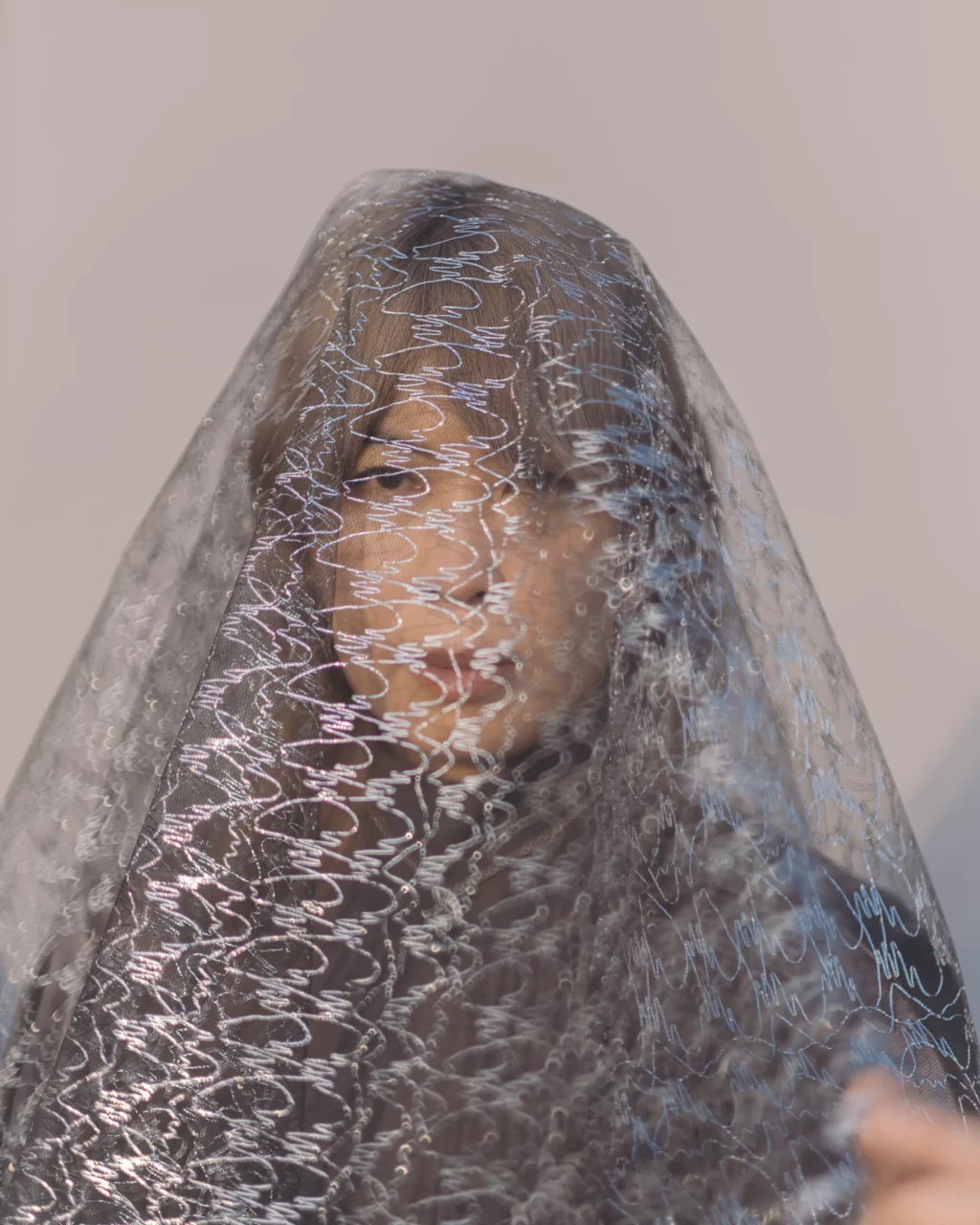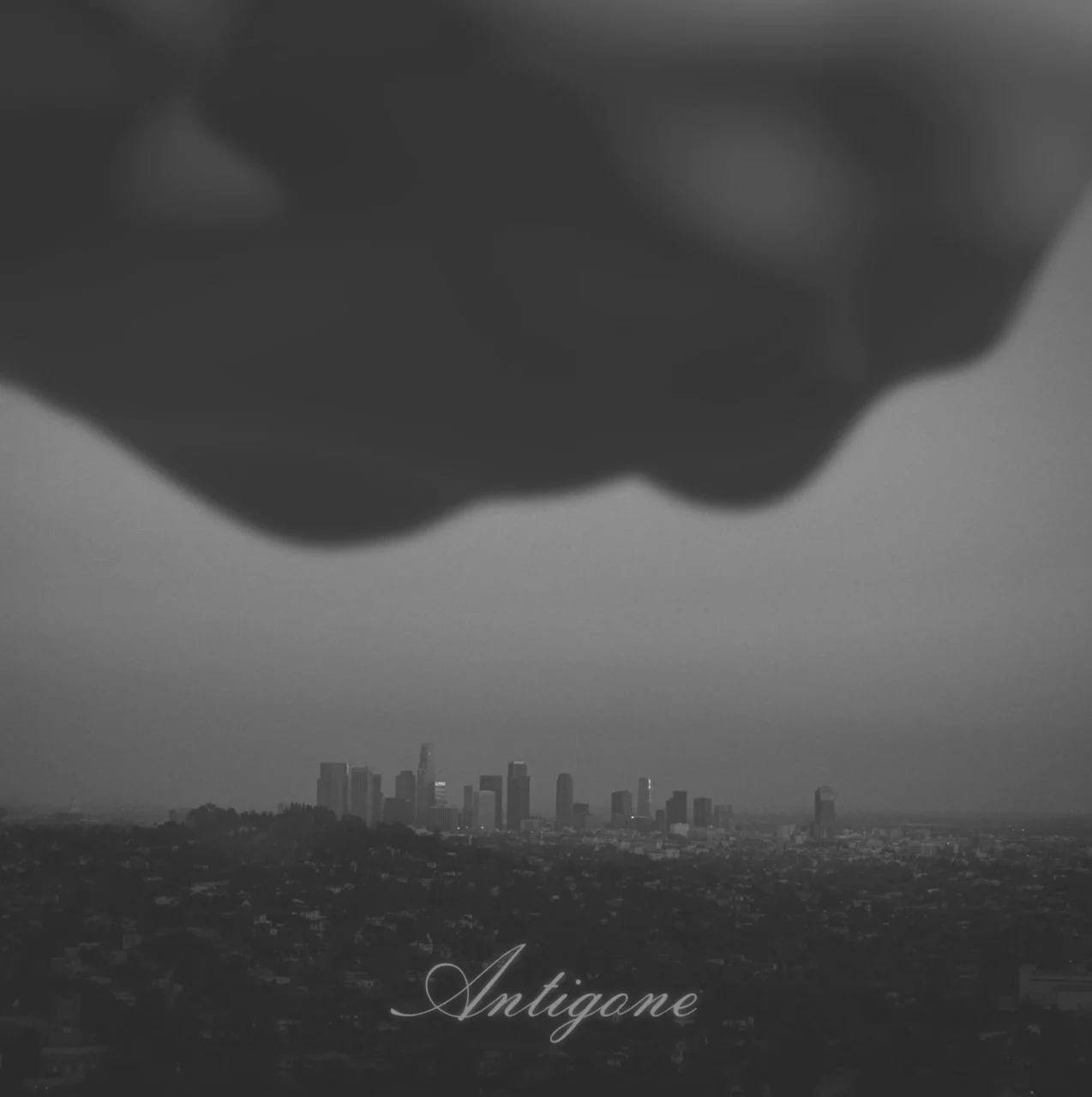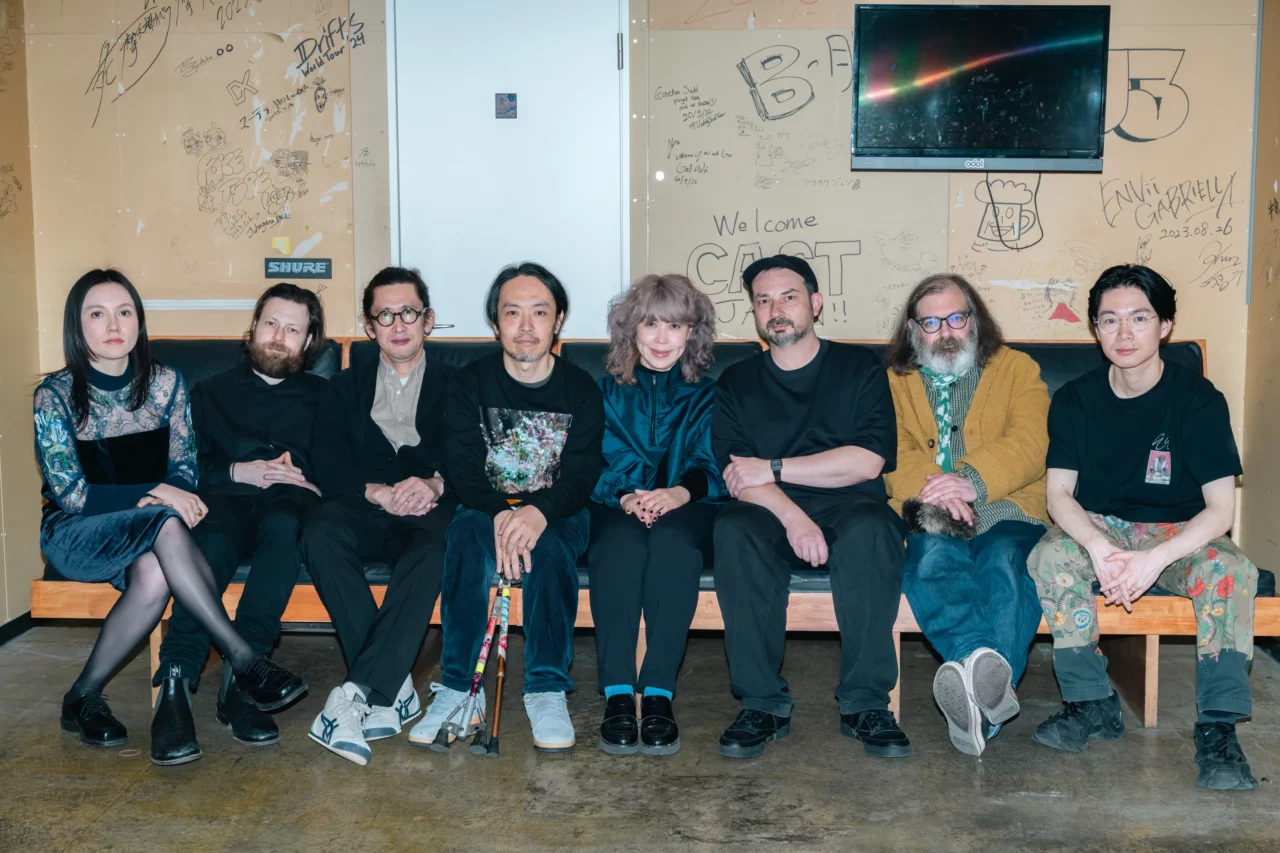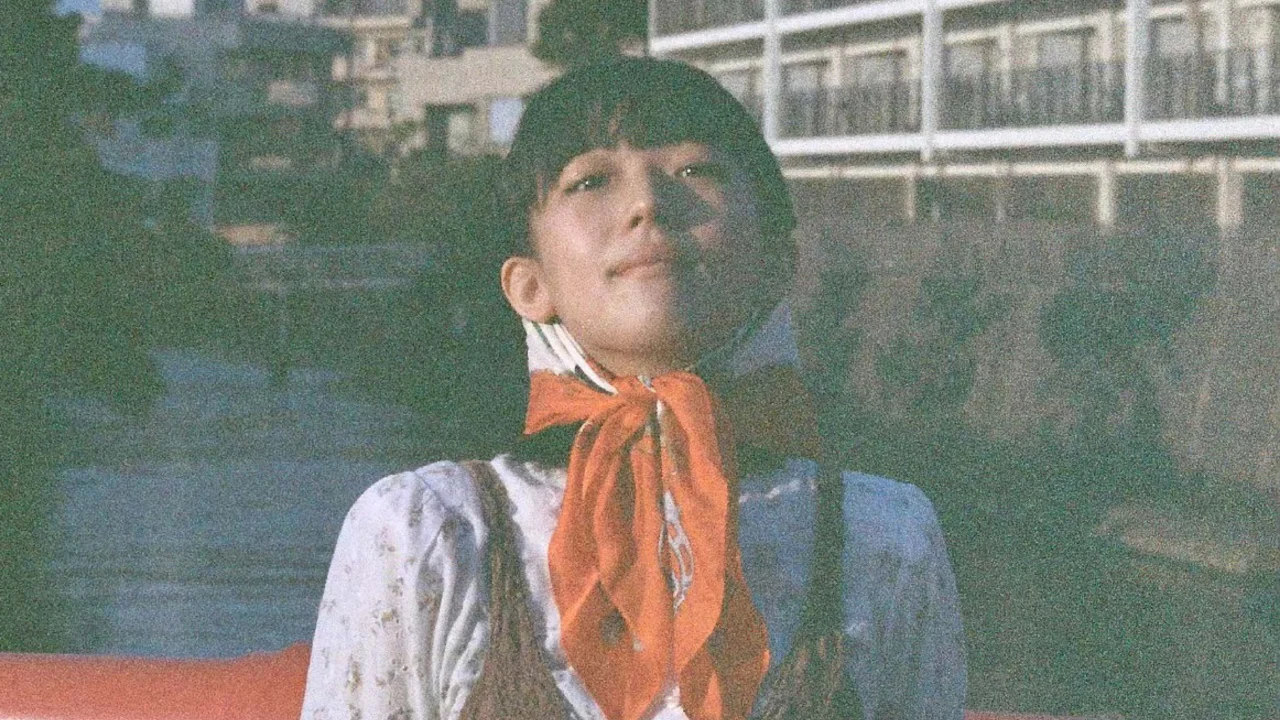In a quiet town blessed with nature, plans to build a glamping site stir a deeper conflict — one that echoes the theme of “undecidability” woven throughout Ryusuke Hamaguchi’s film ‘Evil Does Not Exist’ (2024). This very tension courses through Eiko Ishibashi’s new album, Antigone, which draws inspiration from the ancient Greek tragedy of a sister caught between loyalty and law.
Ishibashi channels both raw anger and hesitant doubt, reflecting on grief and resistance in a world that demands impossible choices. Here, she shares how Antigone came to life — a work deeply entwined with the complex systems and social realities surrounding music and the artist today.
INDEX

A musician based in Japan who plays piano, synthesizer, flute, marimba, drums, and other instruments. She has released albums on labels such as Drag City, Black Truffle, Editions Mego, and felicity. In 2021, she composed the music for Ryusuke Hamaguchi’s film ‘Drive My Car.’ Since 2022, she has been a resident artist at NTS. In 2023, she collaborated again with Hamaguchi, creating the music for ‘Evil Does Not Exist’ and the silent film ‘GIFT,’ which features live performances. In March 2025, she released Antigone, her first vocal album in seven years, on Drag City.

The Shared Emotion of “Anger” Between Ishibashi and Hamaguchi
In a previous interview about Ryusuke Hamaguchi’s film Drive My Car (2021), I heard that “anger” is a source of inspiration for Ishibashi-san’s creative work, and I felt that you seem very angry this time around.
Ishibashi: Yes, that’s true. I also borrowed some of Hamaguchi-san’s anger, and maybe it took shape in this work.
I heard that the film Evil Does Not Exist originally developed from GIFT, a silent film planned as visuals for your live performances, which then evolved into a full-length movie. Did those experiences have a strong influence on this latest work?
Ishibashi: They were created almost simultaneously and in parallel. When I saw Evil Does Not Exist, I felt a refreshing sense that my own thoughts and discomforts had been concretely expressed through the visuals. It made me realize, “Hamaguchi-san was angry too!” and I was able to compose the music for the film just like that. I believe there is a connection in the source of energy behind this work as well.
Do you discuss social issues, politics, or international events with Hamaguchi?
Ishibashi: We don’t often talk about broad global issues, but we do discuss topics that relate to everyday life.
While doing interviews with Hamaguchi for Evil Does Not Exist, I realized many viewers saw the film as a social statement. I don’t think the film was necessarily meant to be overtly social, but since life and society are so closely linked, it’s natural for people to interpret it that way. At the same time, I feel many people prefer to place “social evil” outside themselves.
Hamaguchi’s films tend to explore social themes like capitalism, feminism, and human rights, right?
Ishibashi: Yes, and when you live your life, it’s impossible not to confront these issues personally.
I felt that Antigone also carries a heightened awareness of these issues.
Ishibashi: I’m not sure. In recent years, I’ve often been outside Japan, and when I’m on planes looking for something to read, I tend to choose documentaries or nonfiction rather than stories. I’ve read books by Han Kang and about Thai political history.
At the same time, traveling to various countries, I’ve started to feel that the world is moving in a clearer, more unified direction—one that many want to see. I think the shock of war plays a part in this, but there’s also this idea that if you don’t speak out against something, it’s the same as agreeing with it. That’s a very frightening thought.
These kinds of things have always existed, but now it feels like it’s finally coming to a head… What used to be just a vague feeling has suddenly escalated into matters of life and death. The way the world has declined since COVID is really alarming.
It’s reassuring that there are people who think this way. Did you approach your creation with a serious tone in mind?
Ishibashi: I had those thoughts, but I wanted the music itself to drift more freely, in a lighter, more floating way [laughs].
INDEX
The Invisible Pressure of “Personal Responsibility” on Creators
So you didn’t start creating this work because you were inspired by social issues or music?
Ishibashi: It may be reflected to some extent, but I wasn’t trying to focus on social issues. I think the lyrics simply express the feelings and thoughts I experience in everyday life at that moment. I didn’t intend to write such serious lyrics, but I guess something just welled up inside me that I had to express.
That strong sense of resistance really came through clearly.
Ishibashi: Also, the death of someone close to me influenced the work. In 2023, I composed the music for a short documentary about Kazuya Hiraide*, an alpine climber.
In July 2024, I was asked to create music for a feature-length documentary about Hiraide’s challenge of an uncharted route on the west side of K2. But he never came back. At that time, I saw unrelated people online saying whatever they wanted. What Hiraide was trying to do was very clear — he wanted to convey something through mountaineering. Yet those who refused to understand shouted the loudest nonsense. It’s really frustrating.
*Kazuya Hiraide is one of Japan’s leading alpine climbers and a mountain photographer. Well known as a pair with Kenro Nakajima, he has won the “Piolet d’Or” — called the “Academy Award of mountaineering” — three times. In July 2024, he attempted an uncharted route on the west face of K2 (8,611 meters), the world’s second-highest peak, but tragically fell and died along with Nakajima.
You sometimes see opinions that make you think, “Are you telling us to just stay home and do nothing?” Or people saying things like, “Don’t waste taxpayers’ money on the arts.”
Ishibashi: Yes, voices like that have definitely become more prominent in recent years. I felt that way even back when journalist Kenji Goto was killed by ISIS.
Right, Kenji Goto, the freelance journalist who died in 2015. It’s hard to wrap our heads around that kind of mentality, but it’s important to realize that those people aren’t some distant force—they’re right there, close to home.
Ishibashi: Exactly. They exist right alongside our everyday lives.
Is it an exaggeration to say that there’s a sense of “musician’s responsibility” behind this album?
Ishibashi: A musician’s responsibility… Honestly, I don’t think artists should have to carry any particular burden. That doesn’t mean artists shouldn’t speak out politically—it just means everyone should feel free to express whatever it is they want to express. If there is a responsibility, it’s simply to devote yourself to your work and create something with your whole life. But at the same time, it’s true that there’s this pressure now — like if you don’t say something, you’re complicit.
I was feeling tired of that kind of talk, and I imagined everyone else must be too. So originally, I intended to make something looser, more carefree—something you could just drift along with while listening. But maybe I haven’t grown enough as a person yet, because I couldn’t quite get there. Sometimes I dream of making a full album of love songs by the time I turn 60.
That makes sense. As an artist, there’s also the option of intentionally putting something gentle or light into the world, especially when society feels this heavy.
Ishibashi: Exactly. But as I kept working on it, the whole thing gradually started to take on more weight.
INDEX
Embracing Ambiguity: What Antigone Represents
What inspired the title Antigone?
Ishibashi: The title came to me as I was trying to find words for the sense of discomfort we’ve been discussing. Antigone is often seen as a symbol of a woman resisting patriarchy.
But for me, her story evokes the feeling of being caught in uncertainty—of living in constant tension on the border between conflicting forces. Rather than boldly declaring “This is who I am,” it’s the questioning—wondering if I or the world I belong to is truly right, and existing in between diverse value systems. I think the title ‘Antigone’ emerged from that space.

Would you say you’re drifting between different value systems?
Ishibashi: Yes. I imagine a kind of graveyard in between them.
“Graveyard” sounds a bit grim for a headline, don’t you think? [laughs]
Ishibashi: [laughs] I’ve actually admired spies since I was a child. I think I’ve always been fascinated by people who exist in that kind of ambivalent space.
So it’s the “dual nature” of spies that drew you in?
Ishibashi: Exactly.
There’s such a strong pressure today to “take a side.” People tend to despise ambiguity—those who stand with one foot on either side. And yet, at the same time, we’re often forced into that ambiguous space whether we like it or not.
Ishibashi: I think everyone, in their own way, is being pushed into that space right now. There’s a film called The Milky Way by Luis Buñuel, and in it, Jesus is this blurry, languid figure—kind of turning water into wine, maybe healing the blind, or maybe not. I find that sense of ambiguity absolutely irresistible.
So the film doesn’t portray Christ as an absolute figure?
Ishibashi: Right. And it’s precisely through that portrayal that the absurdity and even the terror of those who never waver in their sense of “righteousness” comes to the surface.
Note: The Milky Way is a 1968 film that follows two pilgrims on their journey, during which they encounter figures like Christ, the Virgin Mary, and various heretics. These religious depictions are presented in a manner said to be “strictly accurate,” with quotes and references based on the Bible, classical theological texts, and church history. (As of April 2025, the film is available to stream on platforms such as U-NEXT.)
The real Christ might have been indecisive too, after all.
Ishibashi: He may have just been a single, conflicted human being.
These days, there seems to be a tendency to shut down that kind of imaginative thinking.
Ishibashi: Maybe it’s because imagining those things makes people uneasy.
INDEX
How Eiko Ishibashi Approaches Music-Making
Where did the creation process specifically begin?
Ishibashi: Takahisa Yamamoto, the drummer, kept saying, “Hurry up and make the next album with vocals.” While doing vocal live shows with the band during ‘Drive My Car,’ we gradually started thinking, “Maybe it’s time to make something with this lineup.” That was the trigger. To put it simply, I wanted to spend more time playing with the band — well, basically, I just wanted to make music and hang out with everyone.
You’re not a Showa-era jazzman, though [laughs].
Ishibashi: But honestly, that’s pretty much how it feels [laughs].

Photo by Shinichiro Shiraishi
It’s been about seven years since your last album with vocals, and not all the songs convey anger; there are also beautiful and poppy tracks.
Ishibashi: Yes, that’s true. When I was making the album, I wanted to create songs that were easy to listen to and not too difficult for me to perform, but they gradually became more complex.
Do you remember which song you recorded first?
Ishibashi: “Mona Lisa.” This time, we recorded the songs in the order they were completed. I made demos of about three songs with just vocals and Rhodes piano and played them for Marty Holoubek and Tatsuhisa Yamamoto, then we recorded the basic tracks all together.
While working on this, I was also composing the music for Evil Does Not Exist, so there was a break in the recording schedule. On the day we recorded the second round of basic tracks, director Ryusuke Hamaguchi, who had just finished filming Evil Does Not Exist, came by looking very refreshed.
That’s a nice story. This time, the arrangements are really rich and full, aren’t they?
Ishibashi: Yes. Since we had decided to release it directly on “Drag City,” there was no strict deadline, so I took my time. I arranged the music by myself, sometimes spending three days just deciding on one overdub sound.
The dense arrangements might be because Jim O’Rourke and I both bought an Osmose synthesizer around the same time, and we got really excited and played around with them a lot. Jim also offered to do the string and horn arrangements, so I asked him to handle those.
“Drag City” is an independent label based in Chicago, known for experimental music. They have released works by Stereolab, Jim O’Rourke, The High Llamas, and Ishibashi Eiko’s albums “car and freezer” (2014) and “The Dream My Bones Dream” (2018).
Has your production environment stayed the same?
Ishibashi: I still use Pro Tools, but I really work in a very analog way.
Do you feel that this analog approach gives you a stronger sense of actually making music?
Ishibashi: Yes, there might be places I can only reach this way, places I can’t get to otherwise. It’s the same with orchestral works. Some people create entirely with MIDI, but I prefer to play something myself first and then convert it to MIDI.
So, rather than completing everything purely in software, music for you comes from something that has passed through your physical body and senses?
Ishibashi: Exactly. I absolutely never use a grid or a click track.
I think using a click track makes things easier, though.
Ishibashi: That’s true, but I get bored. I start to dislike facing the work. It’s different when I’m working on film music, but basically, I don’t use it.
Because film work requires precision down to the frame, right?
Ishibashi: Yes, exactly.

You also do improvisational work and performances, but has the role improvisation plays in your music changed over time?
Ishibashi: It might not have changed. For this album, I did add synth improvisations over some mostly finished tracks.
It seems there’s also a sort of self-dialogue aspect to it.
Ishibashi: Yes, that’s true for the album, and I’ve been really enjoying improvisation in live shows too. But whereas I used to want to play with anyone, now I feel like I’m okay with not doing that anymore.ith that.
Why do you think that is?
Ishibashi: Maybe because I’m not very interested in improvisation that’s just about throwing out things from one’s stock or toolkit. Music isn’t a kind of word game or quick-fire quiz.
When you watch video sites, there’s a lot of flashy, super-technical stuff — music nowadays has a sports-like aspect. Watching videos on YouTube of “Look what phrase I can play,” it’s impressive but also makes you wonder, “So what?”
Ishibashi: I think I don’t really need to do that myself.
Maybe the meaning of music itself is changing nowadays.
Ishibashi: Yes, definitely. The experience of “listening to music” has also changed fundamentally. For me, working on film music has made me think about music in a deeper way, which might be a big part of it.
INDEX
Humor Peeking Through Anger and Seriousness
When did the concept for this album, its track order, and the lyrics come together?
Ishibashi: The lyrics were completed after all the songs were finished.
Was the concept formed by that stage?
Ishibashi: Yes. It’s the graveyard.
That image comes through, including on the album jacket. In Japan, a graveyard can represent the edge of a community, a boundary separating life and what lies beyond.
Ishibashi: Exactly. When I think about that, it makes me grin. Even at funerals, no matter how sad it is, or when a close friend passes away, there are moments that make you want to smile a little.

I understand what you mean. Sometimes there are situations where you just wonder why things have turned out this way.
Ishibashi: Yes.
Besides the alpinist you mentioned earlier, have others close to you passed away as well?
Ishibashi: Last summer, a close friend of mine who was the same age passed away from cancer. She used to make perfumes and candles, and I even created a work that paired her candles with my records. She was really sharp-tongued and only ever said harsh things. You don’t find many friends like that, and it’s very sad when someone like her is gone.
Was she also tough on your music?
Ishibashi: Yes, she often gave me tough feedback [laughs].
When your career becomes more established, people like that tend to disappear, don’t they?
Ishibashi: My career isn’t really established yet (laughs), but I’ve always been helped by people who tell me tough truths.
I felt that the lyrics reached a unique new level.
Ishibashi: I think I did write some parts with a bit of playfulness. Because I was thinking about very serious things, I also felt the urge to joke around. From there, I gradually found it easier to write.
In Antigone, there’s a line about “wetting the law.” I think it’s a pun on “cheek,” and I was really impressed by the word choice.
Ishibashi: Since the songs have more of a floating, drifting feel, I imagined the lyrics like a somewhat rough gravel road—kind of violent and coarse.
Even when you sing those rough, gravel-road-like words, you make them sound in many different ways. It makes listeners think about what you’re actually singing. Your unique singing style seems to have leveled up again.
Ishibashi: That’s good to hear. I’m just desperately trying to sing so that it fits the song—I don’t use any technical tricks.
In the lyrics of “The Model,” the word “organ” appears, but that’s the first time I’ve heard a song harmonizing with that word [laughs].
Ishibashi: I want everyone to sing it together in a big chorus.
I think this song points out a frightening situation when you really think about it: the human body becoming, or being treated as, a tool for business.
Ishibashi: Yes, that’s right. Hamaguchi-san introduced me to a music-loving person with ALS, and learning about euthanasia influenced this song a lot.
I do think there are cases where euthanasia should be accepted, but if society approves it broadly, there’s a danger that people who become ill might be seen as beings who should die. I had never seriously considered this perspective before.
There’s a frightening aspect where bedridden people might be assumed by others to have no value in living.
Ishibashi: Exactly. It’s truly sad when someone close to you is socially affirmed as someone who should die.
























